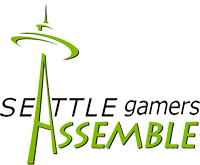Forming a Gaming Community

Seattle Gamers Assemble! (SGA) is a loose community of role-players centered around Seattle, Washington. After several years of operations, we thought it might be nice to share what we've learned about setting up a gaming community.
- What is a Gaming Community?
- In this article, we mean by "gaming community" a group of people that adopts a certain structure or organization to support game-related activities. At SGA, we focus on role-playing games but most of this advice is directly applicable for other types of games or even other activities.
PEOPLE
Who Will Join Me?
Let's assume you're trying to get a group organized locally, focusing on role-playing games. Who might be interested in joining?
- Newcomers and people without a regular game, looking to form small gaming groups.
- People looking for drop-in games or players.
- People who like to try different games.
- Game designers (whether they be published professional or hobbyists with a beloved homebrew system) looking for playtesters or actual play.
- Gamers looking for social contact with other people sharing their interests.
- Players and game-masters hoping to improve their skills through practice or discussion.
Many of those will be looking for other players, will make contact, and then will disappear from you club, mailing list, etc. Given half a chance, a few will form a core interested in recurring activities and discussions.
Different Strokes
Your community is likely to attract people with different skills and interests. That's a good thing! You want those different skill sets and points of view because they will allow you to do more things and attract more new people.
For example, in our group we currently have:
- A lady who is unfailingly reliable and has the inexhaustible patience to round up participants, week after week (fortunately, she has help these days.)
- A guy who loves to start discussions on various GMing and play topics, gathering threads from various online sources and pitching summaries to get weekly discussions rolling.
- A guy who took charge of updating the calendar on a weekly basis, coordinating with various GMs and organizers to help schedule their events without calendar conflicts.
- A gal who compiles and updates sources of information (useful links, store directories, wikis, etc.) and makes them available.
- A guy who is good with graphics and creates catchy posters and logos.
- Several people who have a favourite setting or system and love to run, play, or discuss it regularly.
- Several people who have recurring games ready for our Weekly Short-Shots.
- Several people who love to tinker with systems and playtest the results of their brainstorming.
- Several people who like to show up at events just to meet-and-greet and play whatever is available.
- Several people who like to playtest new games.
- Several fans of indie games.
Naturally, several people wear more than one of these hats!
So check with your core group of people interested in starting this community, and see what everyone likes to do and/or is good at. And harness those skills! Let the artist draw, the organizer plan, the enthusiast start discussions, etc.
STRUCTURE
What kind of structure fits the community you are forming? There is a plethora of models available, some more structured, some more informal or flexible. Although for brevity's sake we often lump all of these into one big category, here are some fine distinctions to support discussion and generate ideas:
- ONLINE GROUP
That's the model for Seattle Gamers Assemble! We started out as, and still are, just a mailing list where people communicate to organize various events. We're as informal as they come: anyone who signs up or shows up is a member. We have few rules ("don't spam" and "don't troll" are about the extent of it), no officers, no assets.
To form an online group, all you need is a mailing list, a forum, a blog, a Usenet group, or whatever communication tool you prefer that will support discussions (but see Online Presence below for more discussion.)
Besides SGA, examples of online communities in Seattle include:
- Seattle Area Role Players (LiveJournal-based)
- Third Place Gamers (Yahoo! Groups-based)
- Puget Sound Roleplayers Meetup Group (Meetup-based)
- [http://dnd.meetup.com/192/ Seattle Dungeons